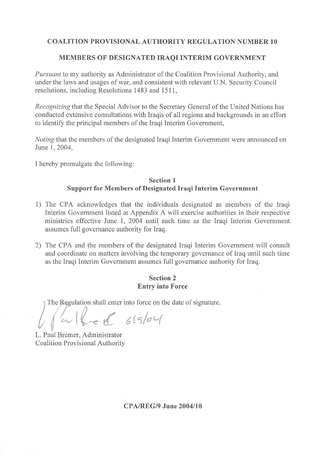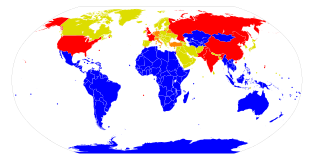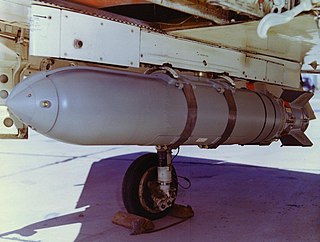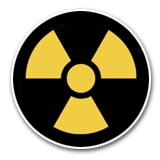
The International Atomic Energy Agency (IAEA) is an intergovernmental organization that seeks to promote the peaceful use of nuclear energy and to inhibit its use for any military purpose, including nuclear weapons. It was established in 1957 as an autonomous organization within the United Nations system; though governed by its own founding treaty, the organization reports to both the General Assembly and the Security Council of the United Nations, and is headquartered at the UN Office at Vienna, Austria.
A United Nations General Assembly resolution is a decision or declaration voted on by all member states of the United Nations in the General Assembly.
The Baruch Plan was a proposal put forward by the United States government on 14 June 1946 to the United Nations Atomic Energy Commission (UNAEC) during its first meeting. Bernard Baruch wrote the bulk of the proposal, based on the March 1946 Acheson–Lilienthal Report. The Soviet Union, fearing the plan would preserve the American nuclear monopoly, declined in December 1946 in the United Nations Security Council to endorse Baruch's version of the proposal, and the Cold War phase of the nuclear arms race followed.
The United Nations Atomic Energy Commission (UNAEC) was founded on 24 January 1946 by the very first resolution of the United Nations General Assembly "to deal with the problems raised by the discovery of atomic energy."

United Nations Security Council resolution 1546, adopted unanimously on 8 June 2004, after reaffirming previous resolutions on Iraq, the Council endorsed the formation of the Iraqi Interim Government, welcomed the end of the occupation and determined the status of the multinational force and its relationship with the Iraqi government.
The United Nations Commission on Conventional Armaments was founded as a result of the founding United Nations treaty in 1946. The goal of the commission was to find ways to reduce the size of non-nuclear armaments around the world. The Commission was formally established by the Security Council Resolution on 13 February 1947. The five permanent members of the United Nation Security Council could not agree on how to achieve this aim and so the first report of the Commission in 1949 made no substantial recommendations.

United Nations Security Council Resolution 1747 was a United Nations Security Council resolution, written with reference to some IAEA reports, that tightened the sanctions imposed on Iran in connection with the Iranian nuclear program. It was adopted unanimously by the United Nations Security Council on 24 March 2007.

United Nations Security Council Resolution 1696, adopted on July 31, 2006, after expressing concern at the intentions of the nuclear programme of Iran, the Council demanded that Iran halt its uranium enrichment programme.
This is the timeline of the nuclear program of Iran.

UN Security Council Resolution 1835 was adopted unanimously by United Nations Security Council on 27 September 2008. The resolution was in response to 15 September report of the International Atomic Energy Agency (IAEA) that stated that Iran had not suspended uranium-enrichment-related activities. The resolution reaffirmed four previous Security Council resolutions: 1696 (2006), 1737 (2006), 1747 (2007), and 1803 (2008).

United Nations Security Council resolution 1154, adopted unanimously on 2 March 1998, after reaffirming Resolution 687 (1991) and all other relevant resolutions, the Council endorsed a memorandum of understanding signed between the Secretary-General Kofi Annan and the Deputy Prime Minister of Iraq, Tariq Aziz.

United Nations Security Council Resolution 1887, adopted unanimously on 24 September 2009, the Council addressed non-proliferation and the prevention of the spread of weapons of mass destruction in the world.

United Nations Security Council resolution 699, adopted unanimously on 17 June 1991, after recalling Resolution 687 (1991) and noting the report by the Secretary-General it requested, the council, acting under Chapter VII, confirmed that the International Atomic Energy Agency and United Nations Special Commission have the authority to undertake weapons inspections in Iraq and to remove, destruct or render the weapons harmless.

United Nations Security Council Resolution 707, adopted unanimously on 15 August 1991, condemned Iraq for violations and non-compliance of Resolution 687 (1991) and extended powers to the Special Commission and IAEA. It was adopted after recalling Resolution 687 (1991) and hearing representations from the International Atomic Energy Agency (IAEA) and United Nations Special Commission.

United Nations Security Council resolution 1051, adopted unanimously on 27 March 1996, after reaffirming resolutions 687 (1991), 707 (1991) and 715 (1991) on the monitoring of Iraq's weapons programme, the council approved a mechanism for monitoring Iraq's imports and exports of "dual use" items.

United Nations Security Council resolution 1194, adopted unanimously on 9 September 1998, after reaffirming resolutions 687 (1991), 707 (1991), 715 (1991), 1060 (1996), 1115 (1997) and 1154 (1998) concerning Iraq's weapons programme, the council condemned Iraq's decision to suspend co-operation with the United Nations Special Commission (UNSCOM) and the International Atomic Energy Agency (IAEA).

United Nations Security Council resolution 1205, adopted unanimously on 5 November 1998, after recalling all resolutions on Iraq, particularly resolutions 1154 (1998) and 1194 (1998) concerning its weapons programme, the Council condemned Iraq's decision to cease co-operation with the United Nations Special Commission (UNSCOM).

United Nations Security Council Resolution 1957, adopted unanimously on 15 December 2010, after recognising positive developments in Iraq since the adoption of 661 (1990), the Council lifted sanctions relating to weapons of mass destruction, long-range ballistic missiles, and the acquisition of nuclear weapons.

United Nations Security Council Resolution 1673, adopted unanimously on April 27, 2006, after considering a report from the Committee of the Security Council established in Resolution 1540 (2004) concerning non-proliferation, the Council extended the mandate of the Committee monitoring the resolution's implementation concerning weapons of mass destruction and their means of delivery until April 27, 2008.
United Nations Security Council Resolution 1762 was adopted on 29 June 2007.












